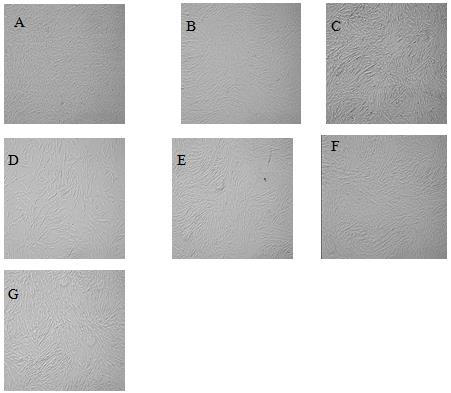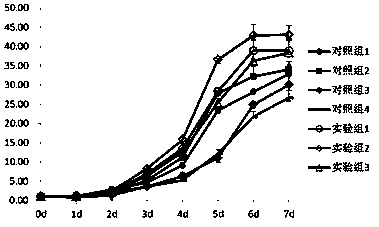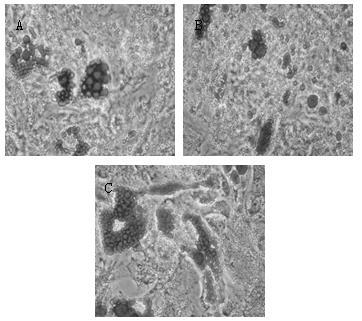Serum-free culture medium for mesenchymal stem cells
A serum-free medium and mesenchymal stem cell technology, applied in the field of serum-free medium for mesenchymal stem cells, can solve the problems of difficult product development, unclear chemical composition of added substances, unfavorable separation and purification of target proteins, etc.
- Summary
- Abstract
- Description
- Claims
- Application Information
AI Technical Summary
Problems solved by technology
Method used
Image
Examples
preparation example Construction
[0121] The preparation of the serum-free medium described in this application can be prepared according to the methods well known to those skilled in the art. After mixing the components at a specific time, they are filtered and sterilized in a filter membrane to obtain the mesenchymal stem cells (UC-MSCs). ) serum-free medium.
[0122] The mesenchymal stem cell-promoting polypeptide composition provided by the present invention has clear chemical composition, no animal source, no serum, extremely low protein content, stable performance, can realize rapid proliferation of UC-MSCs, solve the problem of insufficient cell number, and maintain interstitial Biological properties and immunophenotypic stability of mesenchymal stem cells.
Embodiment 1
[0124] Example 1 Preparation of serum-free medium
[0125] 1) Based on α-MEM basal medium, prepare serum-free medium according to the following raw material ratio:
[0126] Lipid mixture: 1vol%;
[0127] Glutamine: 2mM;
[0128] Hydrocortisone: 50µg / L;
[0129] Zinc sulfate: 0.5mg / L;
[0131] Ferric citrate: 50µM;
[0132] Vitamin C: 100µM;
[0133] Recombinant human epidermal growth factor: 20µg / L;
[0134] Recombinant human basic fibroblast growth factor: 20µg / L;
[0135] RGD short peptide: 10µg / L;
[0136] Palmitoyl tripeptide-5: 25µg / L;
[0137] Palmitoyl Tetrapeptide-7: 25µg / L;
[0139] L-Glutathione: 4mg / L;
[0140] Soybean trypsin inhibitor: 100mg / L;
[0141] β-mercaptoethanol: 2.5mg / L;
[0142] Ethanolamine: 0.2g / L;
[0143] Sodium selenite: 0.00067mg / L;
[0144] Sodium pyruvate: 0.1mM;
[0145] Hepes: 0.01M;
[0146] NaHCO 3 : 3mM;
[0147] Dissolve the above-mentioned components in wat...
Embodiment 2
[0235] Example 2 Morphological observation and activity detection of UC-MSCs
[0236] Select the P3 generation UC-MSCs to carry out the experiment, and the UC-MSCs are divided into 1×10 4 / cm 2 Density inoculated in T25 culture flasks, with 3 replicates in each group, placed in 5% CO 2 Cultivate in an incubator at 37°C, collect images of UC-MSCs after 48 hours of cultivation, and the results are as follows: figure 1 as shown, figure 1 Middle panel A is the morphology of UC-MSCs in control group 1, panel B is the morphology of UC-MSCs in control group 2, panel C is the morphology of UC-MSCs in control group 3, and panel D is the morphology of UC-MSCs in control group 4 Figure E is the morphology of UC-MSCs in experimental group 1, Figure F is the morphology of UC-MSCs in experimental group 2, and Figure G is the morphology of UC-MSCs in experimental group 3.
[0237] Depend on figure 1 It can be seen that the UC-MSCs in each group grew in a single layer of adherent, most o...
PUM
| Property | Measurement | Unit |
|---|---|---|
| Epidermal growth factor | aaaaa | aaaaa |
| Growth factor | aaaaa | aaaaa |
Abstract
Description
Claims
Application Information
 Login to View More
Login to View More - R&D
- Intellectual Property
- Life Sciences
- Materials
- Tech Scout
- Unparalleled Data Quality
- Higher Quality Content
- 60% Fewer Hallucinations
Browse by: Latest US Patents, China's latest patents, Technical Efficacy Thesaurus, Application Domain, Technology Topic, Popular Technical Reports.
© 2025 PatSnap. All rights reserved.Legal|Privacy policy|Modern Slavery Act Transparency Statement|Sitemap|About US| Contact US: help@patsnap.com



